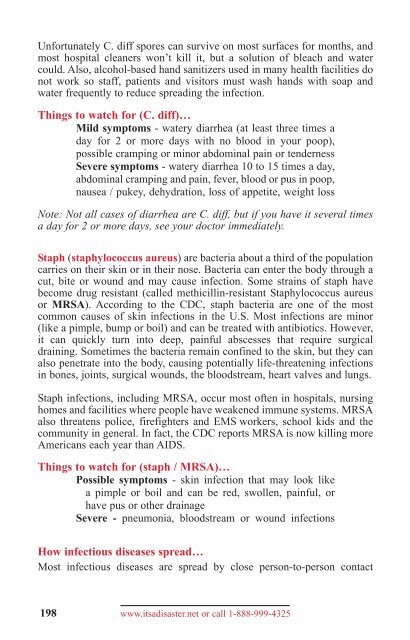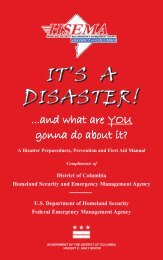disaster 5th 1108_5th ed 2011 - Homeland Security and Emergency ...
disaster 5th 1108_5th ed 2011 - Homeland Security and Emergency ...
disaster 5th 1108_5th ed 2011 - Homeland Security and Emergency ...
Create successful ePaper yourself
Turn your PDF publications into a flip-book with our unique Google optimized e-Paper software.
Unfortunately C. diff spores can survive on most surfaces for months, <strong>and</strong><br />
most hospital cleaners won’t kill it, but a solution of bleach <strong>and</strong> water<br />
could. Also, alcohol-bas<strong>ed</strong> h<strong>and</strong> sanitizers us<strong>ed</strong> in many health facilities do<br />
not work so staff, patients <strong>and</strong> visitors must wash h<strong>and</strong>s with soap <strong>and</strong><br />
water frequently to r<strong>ed</strong>uce spreading the infection.<br />
Things to watch for (C. diff)…<br />
Mild symptoms - watery diarrhea (at least three times a<br />
day for 2 or more days with no blood in your poop),<br />
possible cramping or minor abdominal pain or tenderness<br />
Severe symptoms - watery diarrhea 10 to 15 times a day,<br />
abdominal cramping <strong>and</strong> pain, fever, blood or pus in poop,<br />
nausea / pukey, dehydration, loss of appetite, weight loss<br />
Note: Not all cases of diarrhea are C. diff, but if you have it several times<br />
a day for 2 or more days, see your doctor imm<strong>ed</strong>iately.<br />
Staph (staphylococcus aureus) are bacteria about a third of the population<br />
carries on their skin or in their nose. Bacteria can enter the body through a<br />
cut, bite or wound <strong>and</strong> may cause infection. Some strains of staph have<br />
become drug resistant (call<strong>ed</strong> methicillin-resistant Staphylococcus aureus<br />
or MRSA). According to the CDC, staph bacteria are one of the most<br />
common causes of skin infections in the U.S. Most infections are minor<br />
(like a pimple, bump or boil) <strong>and</strong> can be treat<strong>ed</strong> with antibiotics. However,<br />
it can quickly turn into deep, painful abscesses that require surgical<br />
draining. Sometimes the bacteria remain confin<strong>ed</strong> to the skin, but they can<br />
also penetrate into the body, causing potentially life-threatening infections<br />
in bones, joints, surgical wounds, the bloodstream, heart valves <strong>and</strong> lungs.<br />
Staph infections, including MRSA, occur most often in hospitals, nursing<br />
homes <strong>and</strong> facilities where people have weaken<strong>ed</strong> immune systems. MRSA<br />
also threatens police, firefighters <strong>and</strong> EMS workers, school kids <strong>and</strong> the<br />
community in general. In fact, the CDC reports MRSA is now killing more<br />
Americans each year than AIDS.<br />
Things to watch for (staph / MRSA)…<br />
Possible symptoms - skin infection that may look like<br />
a pimple or boil <strong>and</strong> can be r<strong>ed</strong>, swollen, painful, or<br />
have pus or other drainage<br />
Severe - pneumonia, bloodstream or wound infections<br />
How infectious diseases spread…<br />
Most infectious diseases are spread by close person-to-person contact<br />
198 www.itsa<strong>disaster</strong>.net or call 1-888-999-4325





